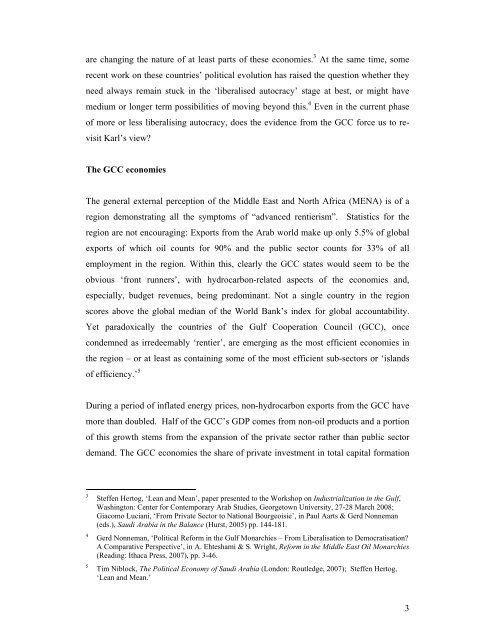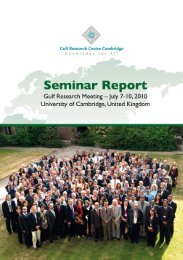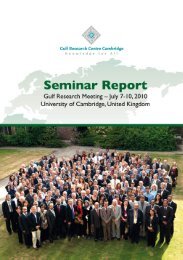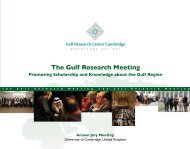Gulf Research Meeting 2010 - Gulf Africa Investment Conference
Gulf Research Meeting 2010 - Gulf Africa Investment Conference
Gulf Research Meeting 2010 - Gulf Africa Investment Conference
You also want an ePaper? Increase the reach of your titles
YUMPU automatically turns print PDFs into web optimized ePapers that Google loves.
are changing the nature of at least parts of these economies. 3 At the same time, some<br />
recent work on these countries’ political evolution has raised the question whether they<br />
need always remain stuck in the ‘liberalised autocracy’ stage at best, or might have<br />
medium or longer term possibilities of moving beyond this. 4 Even in the current phase<br />
of more or less liberalising autocracy, does the evidence from the GCC force us to revisit<br />
Karl’s view?<br />
The GCC economies<br />
The general external perception of the Middle East and North <strong>Africa</strong> (MENA) is of a<br />
region demonstrating all the symptoms of “advanced rentierism”. Statistics for the<br />
region are not encouraging: Exports from the Arab world make up only 5.5% of global<br />
exports of which oil counts for 90% and the public sector counts for 33% of all<br />
employment in the region. Within this, clearly the GCC states would seem to be the<br />
obvious ‘front runners’, with hydrocarbon-related aspects of the economies and,<br />
especially, budget revenues, being predominant. Not a single country in the region<br />
scores above the global median of the World Bank’s index for global accountability.<br />
Yet paradoxically the countries of the <strong>Gulf</strong> Cooperation Council (GCC), once<br />
condemned as irredeemably ‘rentier’, are emerging as the most efficient economies in<br />
the region – or at least as containing some of the most efficient sub-sectors or ‘islands<br />
of efficiency.’ 5<br />
During a period of inflated energy prices, non-hydrocarbon exports from the GCC have<br />
more than doubled. Half of the GCC’s GDP comes from non-oil products and a portion<br />
of this growth stems from the expansion of the private sector rather than public sector<br />
demand. The GCC economies the share of private investment in total capital formation<br />
3 Steffen Hertog, ‘Lean and Mean’, paper presented to the Workshop on Industrialization in the <strong>Gulf</strong>,<br />
Washington: Center for Contemporary Arab Studies, Georgetown University, 27-28 March 2008;<br />
Giacomo Luciani, ‘From Private Sector to National Bourgeoisie’, in Paul Aarts & Gerd Nonneman<br />
(eds.), Saudi Arabia in the Balance (Hurst, 2005) pp. 144-181.<br />
4 Gerd Nonneman, ‘Political Reform in the <strong>Gulf</strong> Monarchies – From Liberalisation to Democratisation?<br />
A Comparative Perspective’, in A. Ehteshami & S. Wright, Reform in the Middle East Oil Monarchies<br />
(Reading: Ithaca Press, 2007), pp. 3-46.<br />
5<br />
Tim Niblock, The Political Economy of Saudi Arabia (London: Routledge, 2007); Steffen Hertog,<br />
‘Lean and Mean.’<br />
3





